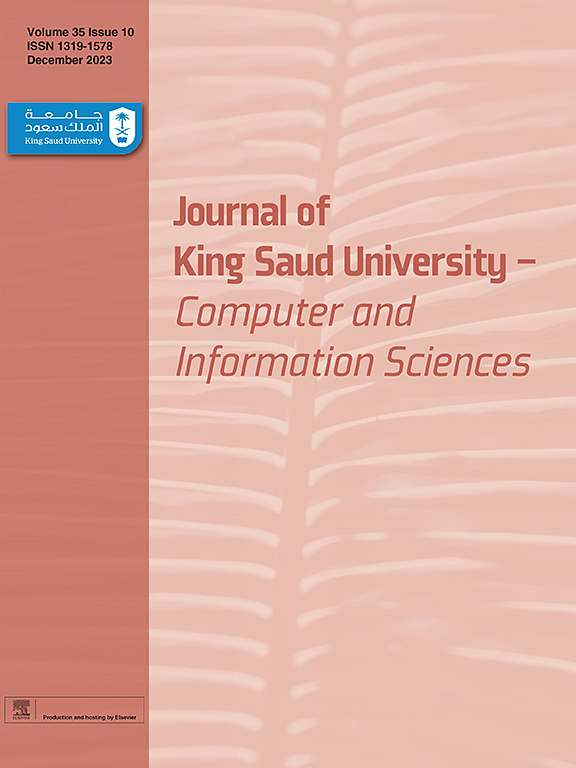Advanced security measures in coupled phase-shift STAR-RIS networks: A DRL approach
IF 5.2
2区 计算机科学
Q1 COMPUTER SCIENCE, INFORMATION SYSTEMS
Journal of King Saud University-Computer and Information Sciences
Pub Date : 2024-10-09
DOI:10.1016/j.jksuci.2024.102215
引用次数: 0
Abstract
The rapid development of next-generation wireless networks has intensified the need for robust security measures, particularly in environments susceptible to eavesdropping. Simultaneous transmitting and reflecting reconfigurable intelligent surfaces (STAR-RIS) have emerged as a transformative technology, offering full-space coverage by manipulating electromagnetic wave propagation. However, the inherent flexibility of STAR-RIS introduces new vulnerabilities, making secure communication a significant challenge. To overcome these challenges, we propose a deep reinforcement learning (DRL) based secure and efficient beamforming optimization strategy, leveraging the deep deterministic policy gradient (DDPG) algorithm. By framing the problem as a Markov decision process (MDP), our approach enables the DDPG algorithm to learn optimal strategies for beamforming and transmission and reflection coefficients (TARCs) configurations. This method is specifically designed to optimize phase-shift coefficients within the STAR-RIS environment, effectively managing the coupled phase shifts and complex interactions that are critical for enhancing physical layer security (PLS). Through extensive simulations, we demonstrate that our DRL-based strategy not only outperforms traditional optimization techniques but also achieves real-time adaptive optimization, significantly improving both confidentiality and network efficiency. This research addresses key gaps in secure wireless communication and sets a new standard for future advancements in intelligent, adaptable network technologies.
耦合相移 STAR-RIS 网络中的高级安全措施:DRL 方法
下一代无线网络的快速发展加剧了对稳健安全措施的需求,尤其是在易被窃听的环境中。同时发射和反射可重构智能表面(STAR-RIS)作为一种变革性技术应运而生,通过操纵电磁波传播提供全空间覆盖。然而,STAR-RIS 固有的灵活性带来了新的漏洞,使安全通信成为一项重大挑战。为了克服这些挑战,我们利用深度确定性策略梯度(DDPG)算法,提出了一种基于深度强化学习(DRL)的安全高效波束成形优化策略。通过将问题框架化为马尔可夫决策过程(MDP),我们的方法使 DDPG 算法能够学习波束成形和传输与反射系数(TARC)配置的最佳策略。这种方法专为在 STAR-RIS 环境中优化相移系数而设计,可有效管理耦合相移和复杂的相互作用,这对增强物理层安全性(PLS)至关重要。通过大量仿真,我们证明了基于 DRL 的策略不仅优于传统优化技术,还能实现实时自适应优化,从而显著提高保密性和网络效率。这项研究填补了安全无线通信领域的关键空白,为未来智能、自适应网络技术的发展树立了新标准。
本文章由计算机程序翻译,如有差异,请以英文原文为准。
求助全文
约1分钟内获得全文
求助全文
来源期刊

Journal of King Saud University-Computer and Information Sciences
COMPUTER SCIENCE, INFORMATION SYSTEMS-
CiteScore
10.50
自引率
8.70%
发文量
656
审稿时长
29 days
期刊介绍:
In 2022 the Journal of King Saud University - Computer and Information Sciences will become an author paid open access journal. Authors who submit their manuscript after October 31st 2021 will be asked to pay an Article Processing Charge (APC) after acceptance of their paper to make their work immediately, permanently, and freely accessible to all. The Journal of King Saud University Computer and Information Sciences is a refereed, international journal that covers all aspects of both foundations of computer and its practical applications.
 求助内容:
求助内容: 应助结果提醒方式:
应助结果提醒方式:


